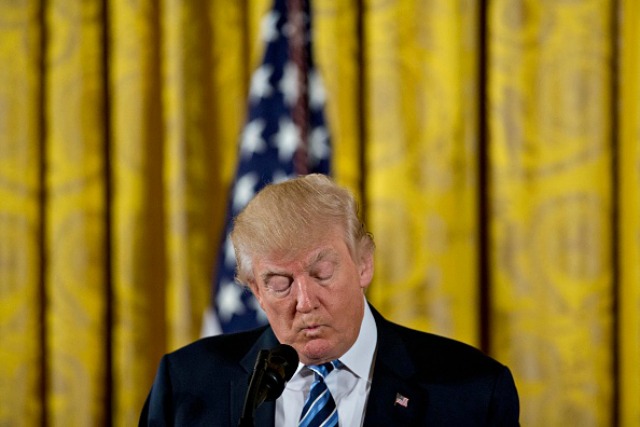Can Donald Trump Even Legally 'Send In The Feds' To Chicago?
By Stephen Gossett in News on Jan 25, 2017 6:24PM

Getty Images / Photo: Pool
When Donald Trump threatened on Tuesday night to "send in the feds" to fix Chicago's violent crime "carnage" problem, it begged a couple of questions: 1) Can he do that? and 2) Can he do what exactly?
The most alarming interpretation would be the National Guard, but what about a less severe deployment of federal agencies, perhaps institutions like the Federal Bureau of Investigation or the Bureau of Alcohol, Tobacco, Firearms and Explosives? To some degree that could happen, at least in in terms of targeting tangential issues, like drug and gun trafficking. But it certainly could not come from a top-down mandate without the request of local governments.
"It's important we recognize the limitations of law enforcement operations," Arthur Lurigio, a criminologist and professor at Loyola University Chicago, told Chicagoist. For those federal organizations to come in, there must be evidence that a federal crime is in progress, Lurigio explained. "The federal government does not enforce state laws," he said. Homicides just generally don't fit the bill.
When federal agencies come in to assist local law enforcement, they often do so as a task force, and they provide resources on cases in which—and this is key—state boundaries have been crossed. A common example is drug trafficking, and sometimes, if applicable, gangs.
"Most drugs in Chicago come across the border of Illinois, so of course, call in the Drug Enforcement Agency" for applicable sting operations, Lurigio said.
But Chicago's homicide and gang violence problems don't really meet the border-crossing criteria that would be needed to bring in the FBI. In the past, the FBI was brought in to target organized crime, under the RICO statue, since those enterprises could be characterized as criminal conspiracies that crossed state boundaries. But that's not the case with today's gangs,
"They're scattered set, quite disorganized—which accounts for nature and motivations of homicides in Chicago. We don’t have big gang enterprises as we did through the 1990s," Lurigio said.
"If somebody shoots somebody, it's the Cook County State's Attorney's business. The FBI wouldn’t be called in. What business would they have? That doesn't break a federal statue," Lurigio added.
Gun trafficking, which is common across the border from Indiana to Illinois, could be a good point of entry for the feds, however. It would be "perfectly reasonable, and could be highly effective, if we had federal resources to stop illegal guns from getting across borders into hands of shooters," Lurigio said.
But all applicable federal assistance would have to be requested, not mandated.“I can't think of a precedent of a president imposing federal resources,” Lurigio said.
Beyond the role of federal agencies, Chicago' violent crime problem needs to be reframed a s public health and police effectiveness issue. Blighted, underinvested neighborhoods and the Chicago Police Department's low murder clearance rate (26 percent last year, according to the Murder Accountability Project) are among the largest factors, neither of which get enough mention, according to Lurigio. Like many others, Lurigio found the president's "feds" call to be more of a retaliation against Rahm for chastising him about crowd-size obsession than a good-faith effort to curb violence.
Clarification is key, too. "I want to know specifically what Mr. Trump is envisioning. I would like him to be very specific. Because we can't just transplant FBI agents into the city to enforce laws," Lurigio said.